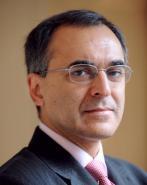June 27, 2011
Maison de la Chimie - Paris
Poverty and the environment
Most of the means of subsistence and development of the 3.4 billion people living on less than $2 a day are based on the productivity of agricultural, forestry, pastoral and marine ecosystems, particularly for food, proteins, access to water, and protection against risks.
Preserving and increasing the productivity of those ecosystems is one of the most efficient policies to combat poverty in the coming years, together with improved access to basic services.
► Plenary session 2 : Poverty eradication and biodiversity
Ahmed DJOGHLAF, Executive Secretary, Convention on Biological Diversity

Julia MARTON-LEFEVRE, Director General, IUCN

Ismail SERAGELDIN, Director, Biblioteca Alexandria

Pavan SUKHDEV, Special Advisor and head Green Economy Initiative, UNEP-WCMC

Speakers' contributions - Plenary session 2
► Thematic session 2.1 : Sustainable management of natural resources and benefits for communities
Constance CORBIER BARTHAUX, Research Division, Agence Française de Développement

Taghi FARVAR, Former Chair of CEESP IUCN, Chair, CENESTA

2000 to 2008, he was President of the Committee for Environmental, Economic and Social Policies (CEESP) at the IUCN. He is currently President of the APAC Consortium (Native and Community Heritage Areas, Switzerland) as well as President of the Centre for Sustainable Development (CENESTA) in Iran.
Mounir LAMINE, Project manager, APP, INRH

Sean NAZERALI, Project Officer Quirimbas National Park (Mozambique)

► Thematic session 2.2 : Enhancing the value of ecosystem services
Helena GARCIA ROMERO, Economist and researcher, Fedesarrollo

Yann LAURANS, Consultant, Ecowhat

Kent REDFORD, Director, Wildlife Conservation Society Institute (USA) and Vice-President of Conservation Strategy, WCS

► Thematic session 2.3 : Preservation of ecosystems and the fight against poverty: territorial challenges
Matthew HATCHWELL, Chief Executive,WCS Europe
Matthew Hatchwell is the chief executive of WCS Europe, an affiliate of the US-based Wildlife Conservation Society (WCS). Mr Hatchwell has worked for WCS since 1986, in New York, the Republic of Congo, Madagascar, and now in the United Kingdom. In Congo and Madagascar, he was instrumental in the creation of Nouabale-Ndoki and Masoala National Parks respectively and has remained involved in the establishment of sustainable funding mechanisms for both sites. One of his interests in the past 10 years has been how to reconcile conservation and development priorities in large landscapes, for example through the development of conservation incentive mechanisms and through participative, multi-stakeholder land use planning.
Stephen HOLNESS, Senior Manager for Strategic Park Planning and Development for South African National Parks

Fabio Rubio SCARANO, Executive Director, Conservation International Brazil


